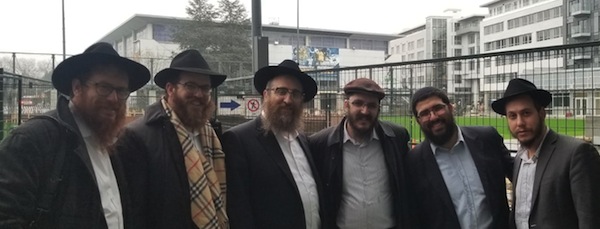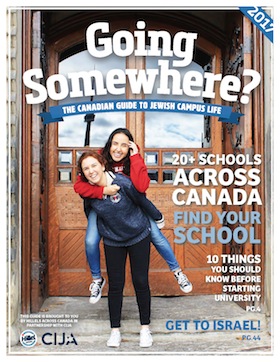Many Jewish students are worried to go to campus in view of threatening and hateful messages and even open hostilities at some Canadian campuses. These are taking place within a wider context of antisemitic incidents in the wake of the eruption of the Hamas-Israel war.
The silence of some Canadian universities in addressing antisemitism, in particular when considered alongside otherwise active approaches toward equity, diversity, inclusion, decolonization (EDID) and racial justice needs to be explicitly addressed.
Legal action has recently been filed against some Canadian universities for failing to address antisemitism.
Anti-Palestinian racism, antisemitism
I’m an education scholar whose work centres on equity, diversity, inclusion, decolonization and anti-racism.
My engagement in this work has been shaped by my own background migrating to Canada from Israel 12 years ago. My graduate studies in Jewish history, with focus on Holocaust memory, made me attuned to injustice.
My migration was informed by concern my children wouldn’t be able to grow up without absorbing the racism against Palestinians that is pervasive in Israeli society. I now fear that my children, and students, will be absorbing antisemitism.
Antisemitism in society at large, on campus
Antisemitism — the prejudice, hatred, and oppression of Jews and one of the oldest forms of racism — is an ongoing concern in Canada.
There has been work at some post-secondary institutions to consider how EDID frameworks need to address antisemitism and also Islamophobia and anti-Palestinian racism both in the context of Israel and Palestinian issues and in the everyday.
But many EDID frameworks — both of specific institutions, and larger guiding frameworks — do not explicitly address these problems. For example, the Federation for the Humanities and Social Sciences’ 2021 “Charter on EDID,” which states the need for “a more resolute effort to achieve [EDID] in our disciplines [and] fields of inquiry,” mentions categories of race, ethnicity and does not name antisemitism.
Addressing covert and explicit discrimination
Because racism and discrimination are often covert in higher education institutions, EDID initiatives focus on creating systemic and institutional changes in all levels and aspects of institutions, including through policies, leadership, hiring, curriculum and student experiences. But this frame is also applied to specific discrimination cases and complaints in higher education.
Universities’ equity, diversity, inclusion and decolonization initiatives are emerging and should rightfully comprehensively respond to specific forms of racism and discrimination. For example, in 2020, work on the Scarborough Charter on Anti-Black Racism and Black Inclusion in Canadian Higher Education was launched and multiple universities have since signed it, pledging “shared recognition of the realities of anti-Black racism.”
Focus on decolonization
Inspired by the Truth and Reconciliation Commission and its 94 Calls to Action, decolonization and Indigenization of Canadian higher education plans have become central for conceiving EDID work.
For example, the second part of the Social Sciences and Humanities Research Council’s Igniting Change 2021 report, from the Advisory Committee on Equity, Diversity, Inclusion and Decolonization, focuses on “Principles, Guidelines, and Promising Practices of Decolonization.”
In Canadian universities, an EDID focus on issues of decolonization and racism is important, given histories and legacies of colonial oppression, racism, exclusion and marginalization affecting Black, Indigenous and people of colour in Canada.
Yet this focus, in specific institutional approaches to EDID, fails to address and at times downplays the history of antisemitism and its ongoing reality in Canada.
Whiteness and Jews’ ambivalent racialized status
Several factors have contributed to this. The majority of North American Jews self-identify as white. “Whitening” allowed white-passing Jews to become part of a white Christian mainstream in ambivalent ways.
This process has reduced Jewish heritage to simply a religious/faith affiliation, even while Jews remain vulnerable to pernicious white supremacist and antisemitic beliefs about Jewishness being “in the blood.”
No doubt, it is complex to identify Jews as a category under “race,” since such a categorization is reminiscent of Nazi ideology. On the other hand, if we understand race as a social construct, the absence of naming antisemitism in EDID frameworks is deeply problematic.
Tools to acknowledge antisemitism
This prevents scholars and educators from acknowledging the historical, institutional, ideological and cultural underpinnings of antisemitism.
Academics working on anti-racism issues trying to bring up antisemitism are often told this is not part of the EDID agenda.
A report by a senior adviser on antisemitism at the University of Toronto’s medical school described how instances of antisemitism were dismissed as political activism against Israel, protected under academic freedom even while this activism was rife with antisemitic dog whistles (such as seeing Jews as “controlling the media” or “owning the university.”)
This conflation points to EDID settler-colonial discourses that position Jews as white colonial forces.
This framing fails to acknowledge the historical, cultural, and spiritual ties of Jews to the land of Israel and also erases the reality that Jews both in Israel and in diasporic communities globally are not a uniform ethnic group. For example, about half of the Jewish population of Israel are “Mizrachi”, descendants of Jews from the Middle East and North Africa.
Not about shielding Israel from critique
Addressing the complexity of Jewish identities doesn’t mean justifying Israeli state politics or shielding Israel from critique.
Critiquing Israel is not antisemitism. Many Jewish and Israeli scholars have strong criticisms toward Israeli politics, just as many Jews object to the killing of civilians in Gaza, and support “free Palestine.”
Unpacking history and current events is important for EDID work.
But portraying Jewish peoples as the embodiment of colonial oppression is an antisemitic trope that legitimizes hate and violence.
Antisemitic tones, slogans in political calls
Antisemitism was seen after Oct. 7 when some academics publicly celebrated the Hamas massacre as a form of decolonizing and liberation, while victim-blaming those murdered and kidnapped.
Colleagues shared video with me of people at University of British Columbia marching and chanting “there is only one solution: Intifada revolution.” For many Jews, this chillingly evokes the “final solution.”
In other protests, demonstrators have carried signs saying: “Keep the world clean,” portraying a trash can with a Star of David in it.
Including all experiences
The failure of EDID to address antisemitism makes Jewish students targets of microaggression and hate on campuses.
Universities must aim to create educational institutions in which all lived experiences are included.
A good way to address antisemitism would be for specific universities and the higher education sector to launch a task force. In so doing universities would also need to address hard political conversations surrounding Israel and settler colonialism. Universities have tended not to address this because of complexity, but this can no longer be avoided.
Jewish students should not be made to feel less than or illegitimate as they attend university. We have a responsibility to condemn and actively address antisemitism as part of our commitment to EDID.![]()
Lilach Marom, Assistant Professor, Faculty of Education, Simon Fraser University
This article is republished from The Conversation under a Creative Commons license. Read the original article.




 “We are proud to publish the first coast-to-coast Canadian guide to Jewish life on campus,” said Marc Newburgh, chief executive officer of Hillel Ontario, in a statement. “For Jewish students, the university experience provides a unique opportunity to connect with their community, shape their Jewish identity for the long-term and develop skills by engaging in Jewish and pro-Israel advocacy. Our hope is that Going Somewhere? will prove a valuable resource for students and their families.”
“We are proud to publish the first coast-to-coast Canadian guide to Jewish life on campus,” said Marc Newburgh, chief executive officer of Hillel Ontario, in a statement. “For Jewish students, the university experience provides a unique opportunity to connect with their community, shape their Jewish identity for the long-term and develop skills by engaging in Jewish and pro-Israel advocacy. Our hope is that Going Somewhere? will prove a valuable resource for students and their families.”